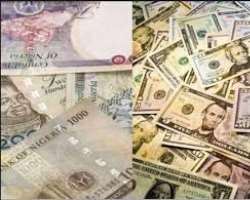Dollar scarcity: Banks set limits on PoS, online transactions abroad

Banks have set limits on overseas Point of Sale (PoS) and online card transactions due to scarcity of the US dollars.
Many of the lenders, which are battling a scarcity of the greenback have pegged monthly transactions on PoS and online transactions using cards at $100, British Pounds Sterling 90, Euro 130 and Canadian Dollars 360.
The ban on cash withdrawals with Automated Teller Machine (ATM) cards while abroad still stands. Travellers are now finding it difficult to pay their hotel bills, make reservations and other transactions using their debit cards after the policy took effect.
Industry sources said had the lenders not restricted the use of ATM cards abroad, some of them would have been facing hitches meeting the dollar demands of their overseas' customers. Such would have exposed the lenders to huge liabilities' shocks and operational challenges as dollar scarcity persists.
Stanbic IBTC Bank, United Bank for Africa, Access Bank, Stanbic IBTC Bank, Standard Chartered Bank Nigeria (StanChart) and GTBank last week announced the suspension of their overseas ATM card services. Also suspended by the banks were all foreign currency-denominated transactions, including those conducted on PoS machines and online.
But in a move to ease the pains of customers, some of the lenders are now allowing transactions on PoS and online deals, under a marginally set limit.
In an emailed note to customers, GTBank said it had reviewed international spending limit on ATM cards downwards but restricted such transactions to cards used on PoS and online transactions.
As a way out of the crisis, banks are now encouraging travellers to open dollar accounts, which have no spending limit. Such cards are issued by the banks on domiciliary accounts funded directly by customers, but the ongoing dollar scarcity and pains of sourcing the greenback makes funding such accounts a herculean task and at cut-throat rates.
The naira closed last week at 310 to dollar in the official market and 450 to dollar in the parallel market.
Chief Economist at Renaissance Capital (RenCap) Charles Robertson, predicted that the naira would end the year at N390 to dollar in the official market, even though it has become undervalued, according to the Forex rate implied by this economist's 13-year average real effective exchange rate (REER) of N286/ to dollar.
RenCap is a leading frontier market research and investment firm, based in many countries, including Nigeria.
'We expect the interbank forex rate to fall further, despite the naira being undervalued, partly due to low market confidence. The widening gap between the parallel forex rate of N450 to dollar and the interbank rate of N310 to dollar implies the market thinks the interbank rate should be lower. However, we do not think the 'market-clearing rate' is as low as the parallel rate suggests, because that market is illiquid,' he said.
'Moreover, the improvement in the current account (CA) to a surplus of 0.3 per cent of Gross Domestic Product (GDP) in June this year against a deficit of 1.6 per cent in June last year, on our estimates, suggests the fall in the parallel forex rate may be overdone. We see the authorities succumbing to mounting pressure - possibly as soon as the November 22 meeting of the Monetary Policy Committee (MPC) - and moving towards a transparent, liquidity-enhancing forex market. Until then, we expect the policy rate to be flat at 14 per cent,' Robertson said in an emailed report.
Naira forwards have soared to records, suggesting foreign investors see another devaluation coming. Contracts maturing in six months trade at N384 per dollar, their highest-ever level. Those due in a year have climbed to N422 from N325 since the end of June. The naira's spot price climbed 1.7 per cent to about N310 to dollar.
The Central Bank of Nigeria (CBN) started tightening capital controls in late 2014 to defend the naira as crashing crude prices crimped export revenues. It then imposed a 16-month peg of N197 to N199 per dollar from February 2015 until June 20 when the flexible foreign exchange policy was unveiled to allow naira float freely in the market. - The Nation.
